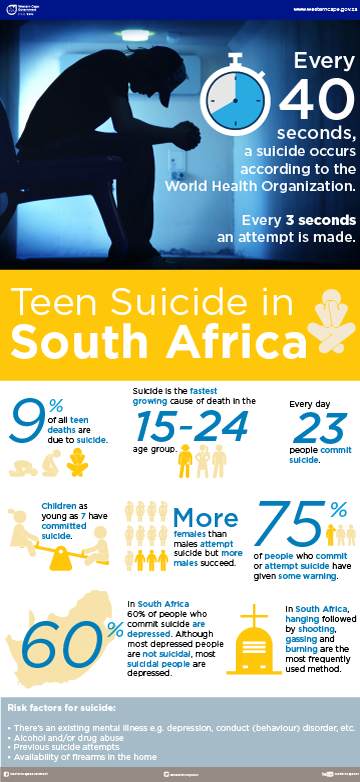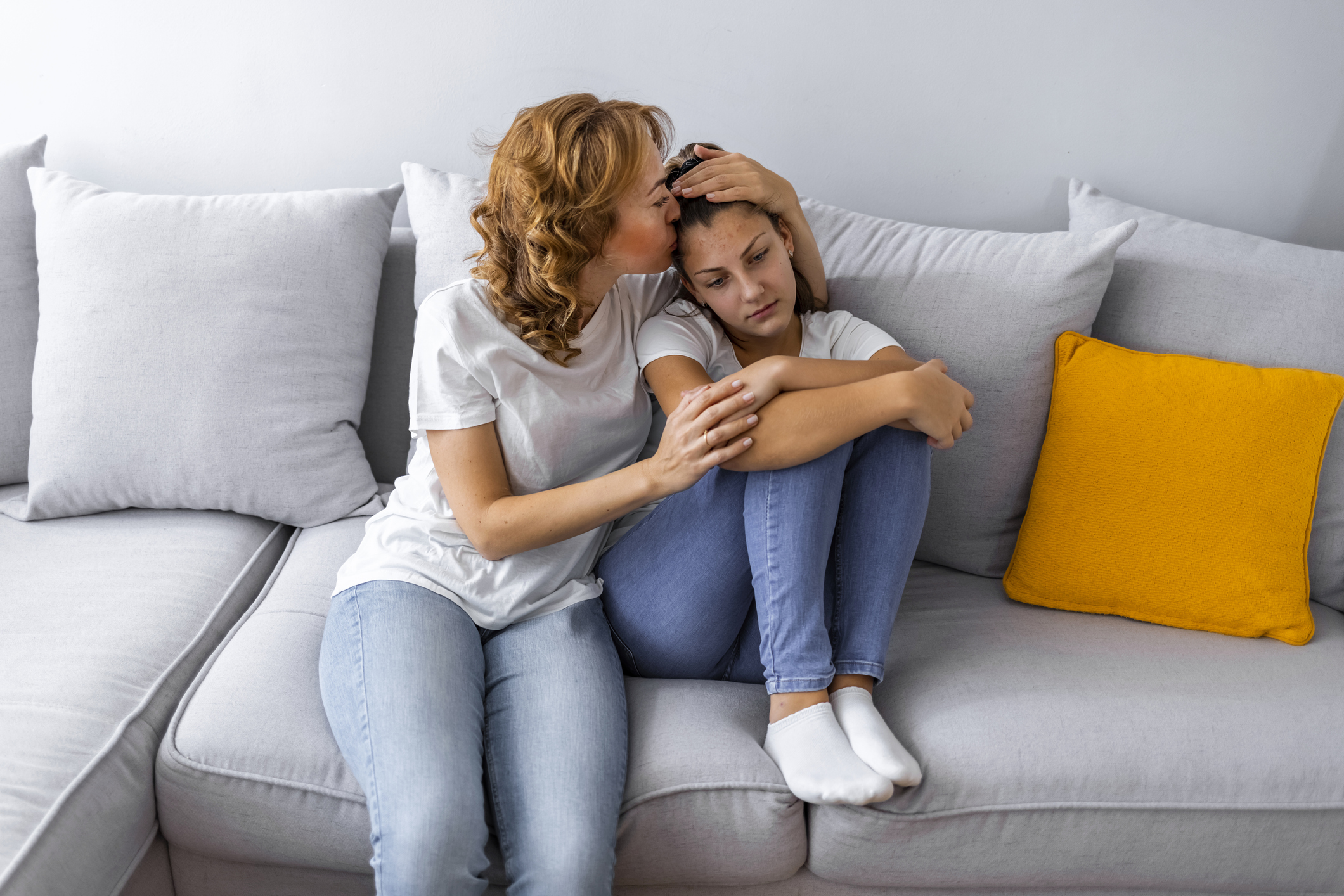Anxiety, depression and adolescent suicide
 Teenagers and adolescents are faced with different kinds of challenges. Previous generations never had to deal with the rapid advancement in technology and the consequences thereof. There’s currently a global increase in teenage depression, anxiety and suicide. Caregivers of adolescents must be aware of what to look out for and where to get help.
Teenagers and adolescents are faced with different kinds of challenges. Previous generations never had to deal with the rapid advancement in technology and the consequences thereof. There’s currently a global increase in teenage depression, anxiety and suicide. Caregivers of adolescents must be aware of what to look out for and where to get help.
According to the World Health Organization, nearly 700 000 people die by suicide every year. That's an average of one person every 40 seconds. Suicide is the 4th leading cause of death among 15 to 19 year-olds globally.
In South Africa, 9% of all teenage deaths are due to suicide and the numbers are increasing.
Anxiety disorders/panic attacks
Panic attacks and anxiety disorders are more than just feeling nervous or worried. Although it may be a short period of intense fear accompanied by different physical symptoms, it can have an impact on your quality of life. Find out more about panic attacks and how to get through a panic attack.
Depression
Not all teenagers with depression attempt suicide but the majority of those who attempt suicide are depressed.
Depression affects your thoughts, moods and body and is treatable, and 80% of those who seek treatment get better.
Warning signs of depression
According to the South African Depression and Anxiety Group (SADAG), the following signs may be indicators of depression in teenagers:
- Loss of interest in fun activities.
- Sadness that won’t go away. Crying a lot.
- Irritability and/or anger.
- Having low energy, constant tiredness or being restless.
- Feelings of guilt or hopelessness.
- Worrying, anxiety and tension.
- Changes in appetite. Eating too little or too much.
- Changes in sleep patterns. Sleeping too little or too much.
- Missing school.
- School marks or performance dropping.
- Having trouble making decisions.
- Thoughts of suicide. Thinking a lot of dying or killing themselves.
- Not socially connected to their peers, loneliness and feeling out of place.
If your loved one is suffering from depression, try to:
- Understand depression so that you know what you’re dealing with.
- Encourage them to keep their mind busy and to do things that’ll make them feel better.
- Help them set realistic goals.
- Help them break large tasks into smaller ones and do what they can.
- Encourage them to be with other people and to confide in someone they trust.
- Encourage them to keep a diary or journal. It’s a great way to get your feelings out.
- Be there to help them.
Bullying
Bullying at school has far-reaching consequences if not addressed and dealt with appropriately. It can have a direct impact on the mental wellbeing of your child.
- Identify the signs of bullying.
- Learn what effects of bullying to look out for.
- Get to know the different types of bullying.
- Know the effects and consequences of bullying.
- Prevent bullying.
- Learn how to support the victim of bullying.
- Find out more about cyberbullying.
- Learn how to help the bully.
- Know where to get help.
 What to do about bullying:
What to do about bullying:
- If you think something might be wrong with your child, ask them.
- Learn to listen to what they’re saying. Make family time a priority where talking is encouraged.
- Take what they say seriously.
- Don’t blame them. It’s not their fault.
- Reassure them that telling you is the right thing to do.
- Never promise your child that you’ll keep it a secret,
- Teach your child to be assertive, self-confident and suggest practical ways to solve the problem.
- Don’t leave your child to sort it out on their own.
- Get your children into extra-mural activities that will help them widen their circle of friends.
- If there’s 1 child being bullied the chances are that there’s more. Talk to your child’s teachers and other parents.
Talking to your children about their mental health may not be easy, but starting the conversation is important.
Suicide
All threats or attempts to commit suicide should be taken seriously. In 75% of all suicides, the person gave some warning or made their intention known to a loved one.
Risk factors for suicide
- Bullying
- Family problems and issues
- Violence
- Emotional and/or sexual abuse
- Relationship problems
- Substance abuse
- Previous attempts to commit suicide
- Ill health or disease
- Family history of suicide or depression
Warning signs of suicide
According to the South African Depression and Anxiety Group (SADAG), the following may be warning signs of suicide in teenagers:
- Depression.
- Talking or joking about suicide.
- Self-criticism e.g. “I can’t do anything right.”, “I’m hideous.”, etc.
- Preparing for death by giving away things and/or saying goodbye.
- Drastic personality changes.
- Not taking an interest in appearance or there’s a drop in personal hygiene.
- Risk-taking behaviour such as using drugs, drinking and driving, unprotected sex, etc.
- Writing poems, essays or painting/drawing images of death.
- Suddenly feeling better. This could mean that they may have decided to commit suicide, set a date for their suicide and they know that their pain will soon end.
 Coping strategies if you’re feeling suicidal
Coping strategies if you’re feeling suicidal
When you’re thinking about suicide you can do the following to prevent you from doing it:
- Tell someone immediately. This could be any person you trust such as a parent or teacher. Call SADAG on 0800 567 567 or SMS 31393.
- Make sure that you’re not alone.
- Don’t use alcohol and/or drugs.
- Ask your family to lock away/hide knives, medication, rope, firearms or anything that can be used to self-harm.
- You might feel that you just want to be alone but withdrawing and isolating yourself from the people who care about you isn’t a good idea.
- Keep pictures of your favourite people or pet(s) with you.
How to help someone who’s suicidal
- Be a willing and active listener.
- If you notice any behavioural changes or warning signs, ask what’s troubling them.
- If there are signs of depression, ask whether they’re considering suicide.
- Don’t argue anyone out of suicide. Let them know that you care, understand and that they‘re not alone. Make them aware that suicidal feelings are temporary, depression can be treated and that problems can be solved. Never say, “You have so much to live for” or that “suicide will hurt your family”.
- If there's an immediate danger of suicide, take the person to their nearest clinic and don’t leave them alone until help is available.
- Remove razors, medication, rope, knives, scissors, firearms, etc. that can be used in a suicide attempt.
- Call your emergency numbers if the above options aren’t available
Where to get help:
The Department of Social Development has trained professionals who offer counseling, support services and family programmes to those who need it. They will help and assist you during what may be a very difficult time. If you require a social worker or any form of psycho-social support, please contact us on our hotline number on 0800 220 250.
South African Depression and Anxiety Group
Suicide Crisis Line: 0800 567 567
Mental health line: 011 234 4837
Contact a Counsellor
Lifeline Western Cape
Telephone counselling: 021 461 1111
WhatsApp: 063 709 2620
Email: info@lifelinewc.org.za
Face-to-face counselling is available during office hours by appointment and are free of charge:
Cape Town
Tel: 021 461 1113
Khayelitsha
Tel: 021 361 9197


